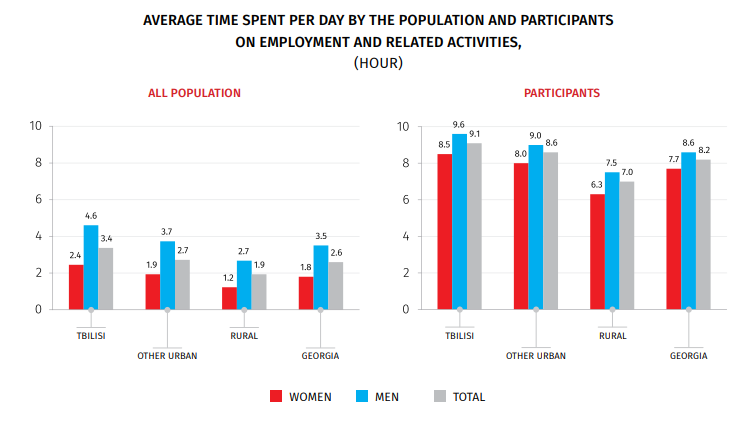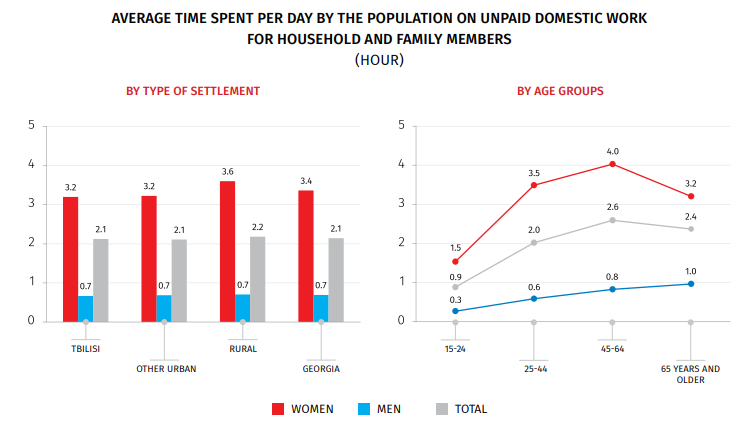
Geostat: Women Spend 4.9 Times More Time on ‘Unpaid’ Domestic Work
A new survey released for the first time by the National Statistics Office of Georgia (Geostat) with the support of UN Women, looked into how much time Georgians spend on different activities and found that women spend 4.9 times more time per day on unpaid domestic services.
Notably, the report found the opposite in the case of employment and related activities, with men spending 1.9 times more time on average than women.
3,680 households were selected by random sampling across the country for the survey. It included persons aged 15 and above who were instructed to write down how much time they spent on various activities over two full, preassigned days.
Survey Findings
Overall, Geostat noted that the average Georgian spends 11.7 hours a day on self-care and maintenance (sleep included), 4.2 hours on culture, leisure, mass media, and sports activities, 2.6 hours on employment and related activities, 1.4 hours on production of goods for own final use, 0.6 hours on unpaid caregiving services for household and family members, 0.3 hours on learning, and 0.1 hours on unpaid volunteer, trainee, and other unpaid work.
Looking at how much time Georgians spend on employment and related activities based on where they live in the country, Geostat noted that those living in Tbilisi spend on average 3.4 hours per day, while the overall average for urban areas is 2.7 hours, and in rural areas, it is 1.9 hours.
On average, however, the population engaged in employment and related activities spends 8.2 hours per day on these activities. Employment activities take on average 9.1 hours in Tbilisi, while those employed in other urban and rural areas spend less time on employment-related activities, 8.6 hours and 7 hours, respectively.

Unpaid Domestic Work
Regarding unpaid domestic work, for women, this indicator is 3.4 hours per day, while for men, it is 0.7 hours per day regardless of the area of residence. Compared with men, women spend five times more in rural areas (3.6 hours) and 4.8 times more in Tbilisi and other urban areas (3.2 hours). Time spent on these activities by women is 5.9 times greater than time spent by men in the 15-44 age group, 4.9 times greater in the 45-64 age group, and 3.3 times greater in 65 years and older population.

As Geostat pointed out, Goal 5 of the 2030 Agenda for Sustainable Development aims to “achieve gender equality and empower all women and girls.” In line with that goal, the indicator recommended monitoring progress in regard to the “proportion of time spent on unpaid domestic and care work, by sex, age, and location.”
In line with that standard, the overall proportion of time spent by women on unpaid domestic and caregiving work is 17.8%, which is about 4.8 times that of men’s time (3.7%). As the report underscored, this is the case in all types of settlements and age groups, with the indicator being highest among women aged 25-44 (23%).
Learning
Significantly, Georgians spend little time on learning activities, with the average Georgian spending 0.3 hours per day. Meanwhile, the population engaged in learning spends on average 4.8 hours on this activity.
Broken down by gender, women spend 4.5 hours on learning activities, while men spend 4.7 hours. Notably, for both women and men, the average time spent on learning “decreases significantly with age.”

This post is also available in: ქართული Русский